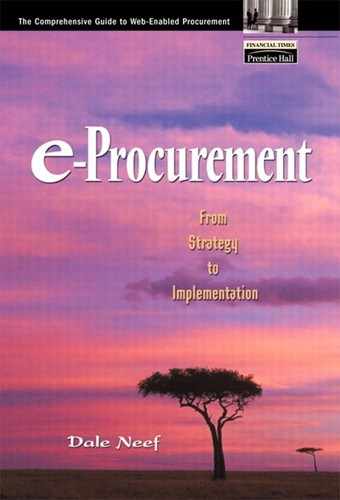Advantages Will Not Be in Savings Alone
Government and military purchasing not only accounts for a huge amount of taxpayer revenue, but it is also big business, responsible for sustaining an enormous number of suppliers throughout the world. And although that sort of buying clout in the hands of a single conglomerate might be worrisome, many would argue that the benevolent focus of government means that—much as spending on IT originally revolved around the needs of the military industrial complex—a strong move toward electronic business by the federal government could serve to dramatically stimulate and upgrade the economy in the coming years.
We should be careful not to underestimate the effect that government endorsement and participation in this area can mean. In the same way (but to a much greater extent) that large purchasing conglomerates, such as Covisint and GlobalNetXchange, can force their supplier base to move toward online purchasing and adhere to certain industry-acceptable standards for communications protocols, so the federal government can move its many hundreds of thousands of suppliers—large and small—toward a more sophisticated, online approach to procurement. In adopting business-to-business e-commerce, the federal government can provide an enormous incentive for suppliers to become Web-enabled and can stimulate economic growth in this area. It can thereby provide an important endorsement for a shift toward the efficiencies and accountability that comes from procuring online, and encourage much broader use of the Internet generally, with all the related developments in software, business startups, and stock market buoyancy that that entails.
Given the advantages of e-procurement, both for government agencies and for the economy as a whole, however, government at all levels in the U.S. has until lately been surprisingly timid in its efforts to move toward online procurement. This is probably in part because of the preoccupation with the Y2K concerns that so dominated much of the last several years. It is probably also due to a combination of the lack of private sector incentives that have been driving e-procurement among businesses, and the same sort of change management problems that tend to plague large, private firms. After all, although as citizens we tend to view the government as a single entity, those involved with government agencies and departments will explain that creating an “enterprise-wide” initiative can be virtually impossible given the overlapping and often competing power interests.
Certainly, however, there is a growing sense of the need for “e-government” to make government services more efficient, more accessible, and easier for the public, and many argue that along with broader e-government initiatives, such as electronic voting, online tax services, and bill payment, e-procurement particularly will be the impetus to move government into the electronic age. It may well be that the original “reengineering the government” effort that was initiated with only limited effect nearly 10 years ago was premature, at least in part because the technology—in the form of the Internet and the growing number of software support platforms—simply wasn’t there to allow for a wholesale restructuring.
